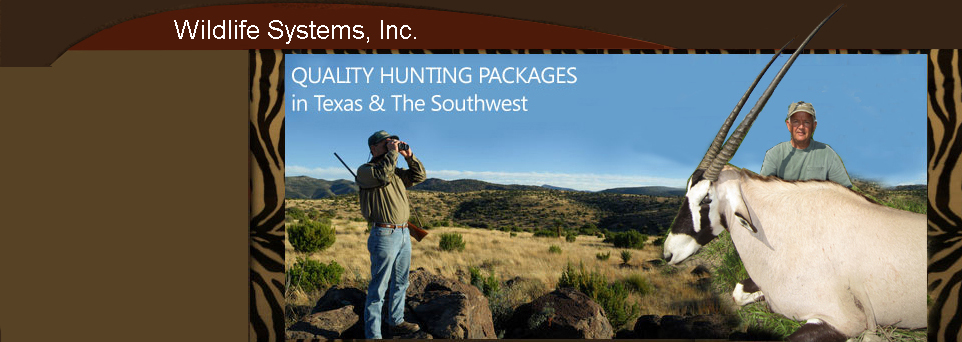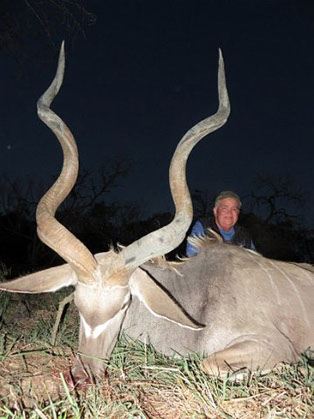(325) 655-0877

Texas Kudu Hunts
Wildlife Systems, Inc.
Terry White
2018 H. Yturria Ranch Kudu
Greater Kudu
The greater kudu (Tragelaphus strepsiceros) is a woodland antelope found throughout eastern and southern Africa. Despite occupying such widespread territory, they are sparsely populated in most areas due to declining habitat, deforestation and poaching. They are one of the most popularly hunted animals in all of Africa and some consider kudu to be the elk version of the African continent. Only the males have horns, which are long and spiraling in shape on the mature males, often extending 50” in length. They are secretive animals, often preferring to spend much of their time in the areas with heavy brushy cover.
In Texas, greater kudu have become a popular exotic on game ranches and their physiological make-up is apparently well-suited for certain parts of the state, as witnessed through their success. Males will often weigh 400 – 600 pounds on the hoof and females are generally about 30% smaller. Though kudu are not quite as big boned and thick muscled as eland, nilgai, and gemsbok, they are still plenty difficult to bring down.

Hunt Packages
Wildlife Systems’ kudu hunts are generally set up as a 2-3 day package. We charge a daily fee which includes meals, lodging, and guide. In addition to the daily fee, our hunters pay a kill fee which is a set amount and is not dictated by the size but is simply a flat kill fee. For more details on our exotic game fees, click on this link.
Location of Hunt
Most of these hunts take place on the historic H. Yturria Ranches, located near Raymondville and McAllen, Texas. These properties are steeped deep in South Texas History. Francisco Yturria was the patriarch of the Yturria Family who was a successful businessman in both South Texas and Mexico. Along with other prominent business people from the mid-1800 era, such as Richard King and Mifflin Kennedy, Yturria amassed tremendous land-holding in the Rio Grande Valley Region of South Texas. Today, descendants of Francisco Yturria continue to operate 3 divisions of H. Yturria Ranches. Greater kudu are found on the Punta del Monte Division which encompasses approximately 12,000 acres and this property supports roughly 60-80 head of kudu.
Meat and Trophy Care
The meat from these animals is excellent eating. So, in addition to a great trophy, you’ll also end of with great table-fare. As part of the package, Wildlife Systems will quarter the meat. We have a walk-in cooler, as well as limited freezer space. On the trophies, our guide will fully cape the head and freeze the cape. You can either take the horns and cape back with you, or we can overnight ship the frozen cape, and you’ll be invoiced for the shipping charges along with a nominal service charge for our time on boxing and shipping. We do not ship meat.
Hunting License
For those hunters who are traveling in from out of state, Wildlife Systems can take care of processing your non-resident license. The cost is $48 and is “over the counter”. You’ll simply need to fill out the Hunter Profile that we will send to you and we’ll take care of the rest.
Gear and Guns
This is a warm part of the world, but it’s best to check the local weather forecast a few days prior to your departure and to pack accordingly. In addition to your regular hunting gear, you might want to bring some sun screen and bug spray. Regarding size of gun, we recommend a minimum of a 180-grain bullet. Please stay away from high expandable bullets such as Nosler Ballistic Tips, Berger bullets, and hollow points. We recommend a bullet that will expand but hold its mass, such as a partition, A-frame, or bonded bullet.
Travel
The nearest airport is Harlingen, if you are hunting the Yturria Ranch and that property is located about 7 miles north of Raymondville. We can provide CONDITIONAL airport shuttle from Harlingen for an additional fee. Most hunters rent a vehicle and drive to the ranch where the guide meets them at the gate. For hunters who are driving from their home, our Wildlife Systems office staff will provide directions, as well as a contact phone number for the guide.
